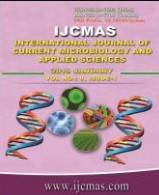


 National Academy of Agricultural Sciences (NAAS)
National Academy of Agricultural Sciences (NAAS)

|
PRINT ISSN : 2319-7692
Online ISSN : 2319-7706 Issues : 12 per year Publisher : Excellent Publishers Email : editorijcmas@gmail.com / submit@ijcmas.com Editor-in-chief: Dr.M.Prakash Index Copernicus ICV 2018: 95.39 NAAS RATING 2020: 5.38 |
Climatic variability has the potential to affect countries highly dependent upon agriculture, resulting in food shortages, among other consequences. Therefore, people who depend on farming will require a myriad of adaptation strategies to mitigate adverse effects of climate change and maintain the livelihoods of farm families. Farmers practice variety of adaptability measures to mitigate and preclude the effect of climate change in agriculture. However, farmers come across varieties of constraints in adaptation in response to climate change. The paper reported the results of 240 farmers of northern Karnataka who are experiencing various constraints in adaptation in response to climate change and also enlisted various suggestions in order to negate the barriers to climate change. Descriptive statistics and Garrett ranking technique were employed for analyzing various socio-economic characteristics and constraints experienced by farmers in adaptation in response to climate change. The results shows that demographic composition was predominantly dominated by old age groups constituting 50.42 % of surveyed farmers followed by middle aged category (29.58%) and rest are young age groups (20.00%). Higher proportions of farmers (58.33%) were members of various social group participation. Little more than 1/3rd of farmers involved in off-farm employment in the region. The main barriers to adaptation includes lack of knowledge and information about climate change and adaptation strategies (GS: 78.09), lack of access to timely weather forecast information (GS: 72.88) and timely availability of farm inputs (GS: 65.44) are attained I, II and III ranks respectively. Majority of the respondents (75.00 %) suggested that weather forecast should be accurate and available in time, whereas 69.58 per cent and 68.33 per cent of farmers suggests that Government support during natural calamities and timely supply of farm inputs on subsidized rate is necessary in order to mitigate negative impact of climate change.
 |
 |
 |
 |
 |